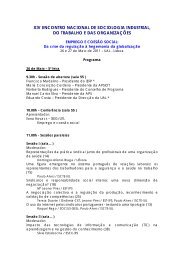Web-based Learning Solutions for Communities of Practice
Web-based Learning Solutions for Communities of Practice
Web-based Learning Solutions for Communities of Practice
Create successful ePaper yourself
Turn your PDF publications into a flip-book with our unique Google optimized e-Paper software.
From ‘Collecting’ to ‘Deciding’<br />
<strong>of</strong> operations. In CoPe_it!, a projection is a view<br />
on a particular collaboration space that provide<br />
the tailored support <strong>for</strong> each stage. Consequently,<br />
the same collaboration space can have three different<br />
projections.<br />
A. The collection and sharing stage. This<br />
is the most in<strong>for</strong>mal setting supported by<br />
CoPe_it! where the tool functions simply<br />
as a web-<strong>based</strong> discussion place (such as a<br />
<strong>for</strong>um) or as common resource repository in<br />
which people can upload and share resources.<br />
The emphasis here is simply to express,<br />
gather and share knowledge items that the<br />
group may possess, making others aware<br />
<strong>of</strong> their existence. No advanced structuring<br />
is at this point necessary. Structuring <strong>of</strong> the<br />
collaboration space cannot be made explicit,<br />
hence no constraints exist on what and how<br />
a resource is related to another in the collaboration<br />
space. Relationships can only be<br />
established by quoting resources (posts) or<br />
by referencing them within the content <strong>of</strong> a<br />
resource (post).<br />
B. The synthesis stage. While the previous<br />
one emphasizes on collecting and initial<br />
feedback on the collected items, this stage<br />
is mainly concerned with providing support<br />
<strong>for</strong> synthesizing existing items and support<br />
the emergence towards coherent knowledge<br />
structures that can act as building blocks <strong>for</strong><br />
decision making purposes. The key aspect in<br />
this stage is that the emergent structures can<br />
be represented explicitly within the system.<br />
In this stage, gathering and collecting resources<br />
is also possible but do not constitute<br />
the main activities. The emphasis is how they<br />
relate to other resources and how they can<br />
be aggregated into larger structure. At this<br />
stage, sense-making means achieving the<br />
crystallization <strong>of</strong> the alternative solutions<br />
and explicitly represent them within the<br />
system.<br />
C. The decision stage. This is the most <strong>for</strong>mal<br />
setting supported by CoPe_it! as at this stage<br />
the alternative solutions <strong>of</strong> the synthesis stage<br />
can be further elaborated with active support<br />
<strong>of</strong> the system. In particular, the knowledge<br />
structures that emerged from the synthesis<br />
stage are trans<strong>for</strong>med into the appropriate<br />
types, whose semantics are understandable<br />
by the system. Hence at this stage decision<br />
making is fully supported.<br />
How argumentative collaboration evolves in<br />
the collection and decision stages has already been<br />
documented in previous work (Karacapilidis &<br />
Papadias, 2001) In the next sections we outline<br />
the mechanisms with which CoPe_it! supports the<br />
notion <strong>of</strong> emergence in the synthesis stage and describe<br />
how the entire collaboration space emerges<br />
from one stage into another. In CoPe_it! the later<br />
is also referred to as switching projections.<br />
Emergence Within the<br />
Synthesis Stage<br />
The projection supporting the synthesis stage<br />
provides a rich set <strong>of</strong> mechanisms with which<br />
the emergence <strong>of</strong> the available resources into<br />
coherent knowledge structures can be supported.<br />
In the next section we present and discuss these<br />
mechanisms in greater detail.<br />
Knowledge Types<br />
CoPe_it!’s projection aiming at the synthesis stage<br />
<strong>of</strong>fers an open set <strong>of</strong> knowledge types with which<br />
the role <strong>of</strong> individual resources can be clarified.<br />
Currently, these include (a) notes, that are used to<br />
represent simple in<strong>for</strong>mation content, the value<br />
<strong>of</strong> which has not yet been assessed by the community<br />
(the content <strong>of</strong> notes can be anything from<br />
text, images or video - a short title acts as the<br />
summary <strong>of</strong> the content), (b) comments used to<br />
annotate content and (c) ideas that constitute the<br />
main abstraction to explicate individual solutions.<br />
135



